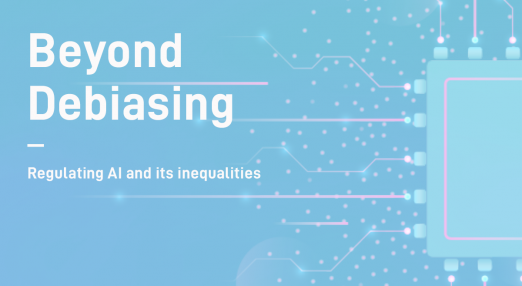Digital Dissidents will introduce those who do not use technology
Czech digital legal organisation and an EDRi member Iuridicum Remedium (IuRe) organised the Big Brother Film Festival in Prague a few months ago, at the end of 2021. Thanks to a collaboration with the Kinolab group and director Barbora Johansson, a movie was created in connection to the festival, which deals with the topics of the digital gap and digital exclusion.
Filter resources
-

Digital Dissidents will introduce those who do not use technology
Czech digital legal organisation and an EDRi member Iuridicum Remedium (IuRe) organised the Big Brother Film Festival in Prague a few months ago, at the end of 2021. Thanks to a collaboration with the Kinolab group and director Barbora Johansson, a movie was created in connection to the festival, which deals with the topics of the digital gap and digital exclusion.
Read more
-

Amnesty International calls to ban discriminatory algorithms in its report Xenophobic Machines
On 25 October 2021, EDRi observer Amnesty International published a report on the use of algorithmic decision-making (ADM) system by the Dutch tax authorities to detect fraud. The report shows how discrimination and racial profiling were baked into the design of the ADM system.
Read more
-

No biometric surveillance for Italian students during exams
In September 2021 the Italian Data Protection Authority (DPA) fined Luigi Bocconi University €200 000 for using Respondus, a proctoring software, without sufficiently informing students of the processing of their personal data and, among other violations, for processing their biometric data without a legal basis. Bocconi is a private University based in Milan and during the COVID-19 pandemic introduced Respondus tools to monitor students during remote exams.
Read more
-

If you want digital policy done right, propose it yourself
Fed up with the digital policies in Germany or the lack thereof in the past decades, EDRi member Chaos Computer Club e.V. (CCC) submitted their own proposal for a digital agenda of the new German government. Digital policy has been severely neglected by past governments. This explains the extended list of topics being tackled in this proposal.
Read more
-

Closing the Loopholes in EU’s Net Neutrality Framework
The European net neutrality rules are being reformed to fix one of the biggest loopholes in the EU‘s framework: Zero-Rating. EDRi has been vocal about the dangers of Zero-Rating, a practice by which telecoms companies discriminate between online services by making some data traffic more expensive than other such traffic. Prompted by three judgments of the Court of Justice of the European Union, the Board of European Regulators for Electronic Communications (BEREC) has acknowledged that their previous 2016 Guidelines on how to enforce the Net Neutrality Regulation have to be overhauled. The direction of the reform is looking to confirm the previous submissions of EDRi over the past six years and today we add another submission to BEREC with the hope of fixing the last loophole in Europe’s net neutrality framework.
Read more
-

Top system and the right to repair
Some questions take thirty years to answer, even if just partially. In the early ’90s of the previous century, the EU legislative process was a battleground of American tech behemoths and some national champions from the EU. The legislative dossier was what was to become the 1991 Software Directive. And it was seen as an opportunity for European tech companies and others to break the hegemony of IBM through interoperability.
Read more
-

Building a coalition for Digital Dignity
In 2020 EDRi started to build the ‘Digital Dignity Coalition’, a group of organisations and activists active at the EU level dedicated to upholding rights in digital spaces and resisting harmful uses of technology. We’ve been organising to understand and resist how technological practices differentiate, target and experiment on communities at the margins - this article sets out what we’ve done so far.
Read more
-

Digital Dignity Document Pool
Digital technologies can have a profound effect on our societies, but sufficient attention is rarely given to how certain applications differentiate between, target and experiment on communities at the margins. This document pool gathers resources for those that are interested in learning about and contesting the harms to dignity and equality that arise from uses of technology and data.
Read more
-

Booklet: If AI is the problem, is debiasing the solution?
The development and deployment of artificial intelligence (AI) in all areas of public life have raised many concerns about the harmful consequences on society, in particular the impact on marginalised communities. EDRi's latest report "Beyond Debiasing: Regulating AI and its Inequalities", authored by Agathe Balayn and Dr. Seda Gürses,* argues that policymakers must tackle the root causes of the power imbalances caused by the pervasive use of AI systems. In promoting technical ‘debiasing’ as the main solution to AI driven structural inequality, we risk vastly underestimating the scale of the social, economic and political problems AI systems can inflict.
Read more
-

EU: €5 million for new wiretapping technologies
The European Commission has made €5 million available for research projects that aim to help law enforcement authorities maintain the ability to intercept telecommunications – something which is threatened by the adoption of new technologies such as 5G networks and “edge computing”.
Read more
-

CJEU in surprise judgment: zero rating is illegal under EU law
Europe’s highest court has put an end to a long-standing legal battle around the EU’s Net Neutrality Regulation. In a landmark judgement published last week, the Court of Justice of the European Union (CJEU) confirmed what EDRi and its members have argued for years: that zero rating is illegal under EU law because it violates the neutrality obligations of internet access providers
Read more
-

Facebook’s dominance makes it difficult to question the truth
What we as a society understand as true is changeable, and questioning the truth can only be done with a healthy public debate. But the dominance of the platforms that facilitate our public debate makes difficult.
Read more
